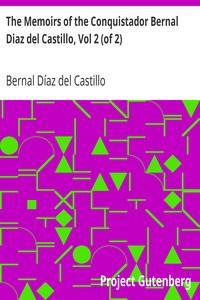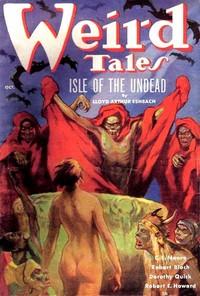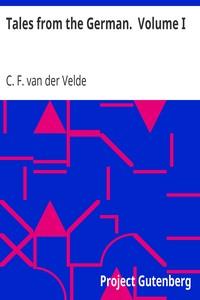Read this ebook for free! No credit card needed, absolutely nothing to pay.
Words: 70944 in 15 pages
This is an ebook sharing website. You can read the uploaded ebooks for free here. No credit cards needed, nothing to pay. If you want to own a digital copy of the ebook, or want to read offline with your favorite ebook-reader, then you can choose to buy and download the ebook.


: The Memoirs of the Conquistador Bernal Diaz del Castillo Vol 2 (of 2) Written by Himself Containing a True and Full Account of the Discovery and Conquest of Mexico and New Spain. by D Az Del Castillo Bernal Lockhart John Ingram Translator - Mexico History
the boats were not to take more than two at a time.
When these vessels arrived there immediately rose a dispute as to whom should be ferried across first, and Saavedra, with his brother Avalos, pretended to have a prior claim, because they happened to be related to Cortes, but Sandoval maintained that this honour was unquestionably due to the three reverend monks. Saavedra persisted, however, that as a relation of Cortes the precedence was due to him, and answered Sandoval in very unbecoming terms, whose blood now also began to boil, and the dispute rose to so high a pitch that Saavedra drew his dagger. Sandoval, who was standing up to his knees in the water to prevent the boats being overloaded, rushed upon his antagonist, and, seizing him by the hand in which he held the dagger, he dragged him headlong into the water. If the rest of us had not hastened up and parted them, Saavedra would most likely have ended his life in this affray, for the troops, almost to a man, were on Sandoval's side.
Four whole days were consumed before all our men had crossed over, during which time we had nothing to eat but the nuts we gathered from some low palm-trees, which we roasted on the fire and ate the kernels. One of our soldiers, named Tarifa, ventured across the river with his horse in a canoe, was upset, and both were most likely drowned, for no traces could be found of either. Two other horses met with a similar fate, one of which was the property of Solis Casquete, who behaved like a madman when he found his horse was lost, and wished our general, with the whole expedition, in the infernal regions.
The excessive hunger we endured during the time we were occupied in ferrying across, created altogether great discontent among the troops, and they murmured loudly against Cortes, and this dreadful march. When we arrived in the town we found our condition very little bettered, for there was neither any bread in the storehouses nor in the dwellings of the colonists; who, in the bargain, were even unacquainted with the surrounding neighbourhood, and only knew the way to two townships, which had long ago been deserted by the inhabitants. Cortes' first care was to adopt some means for obtaining provisions; he, therefore, instantly despatched Luis Marin, with the soldiers of Guacasualco into the country, in search of maise. How far we succeeded in this I will relate in the following chapter.
The population of the town of Buena Vista consisted of forty Spaniards, four Spanish ladies and two mulattoes. The whole of these people were suffering from ill health, and had a yellow sickly appearance about them. They had no provisions, and suffered as much from hunger as we did ourselves, nor could any one tell where we were to go in search of maise for this purpose. Cortes, therefore, saw that there was not a moment to be lost, and he despatched Luis Marin, with the men of Guacasualco, into the country.
We were altogether eighty in number, and we all set out on foot, in order first to see whether horses would be able to traverse the country. An Indian, of Cuba, accompanied us as guide to some townships which lay thirty-two miles further up the country. When we reached these we found, to our inexpressible joy, that they contained great abundance of maise, beans, and other vegetables; besides that, the whole neighbourhood was literally sown with cocoa-nut trees. We first feasted sumptuously ourselves and then despatched a courier to our general, desiring him to send us all the Mexican troops to fetch away the maise, forwarding him in advance ten bushels of the latter as a supply for the moment, and begged of him to send our horses to us.
When Cortes learnt that we had arrived in so fertile a neighbourhood, and was told by some Indian merchants that the road to Naco, where Christobal de Oli was beheaded, led through the township where we were staying, he ordered Sandoval to follow us with the greater part of the remaining troops, and not to leave this township until he should receive further instructions.
Sandoval, on arriving in our camp, was not a little delighted to find us thus surrounded by plenty, and he immediately despatched the Mexicans with thirty bushels of maise to Cortes, who distributed this welcome supply among the colonists, and as they had not been accustomed for a length of time to any other nourishment than fruit and a little cassave bread, they ate so ravenously of the maise that the greater part fell ill in consequence, and seven of them died.
During this great distress for want of provisions, it pleased the Almighty that a vessel should run into the harbour from Cuba, having on board seven passengers, seven horses, forty pigs, eight barrels of pickled meat, and a large quantity of cassave bread. The cargo belonged to a certain Antonio de Comargo, and Cortes purchased the whole of it upon credit, distributing a great part of the provisions among the colonists; but the consequences again proved fatal to many of these unfortunate persons, for they had become so enfeebled, that their stomachs were unable to bear this very nourishing food, which brought on dysentery, and ten more of them died.
As this vessel had brought a few soldiers and had eight sailors on board, Cortes determined to embark in her and sail up the river to visit the townships which lay on the banks, and to explore the interior of the country. He also ordered one of the brigantines of Gil Gonsalez de Avila to be repaired, and a boat to be constructed in the shape of those used in unloading vessels; also four canoes, to be securely fastened together. On board these vessels Cortes embarked with thirty soldiers, the eight sailors, and twenty Mexicans. He may have sailed up the river to the distance of about forty miles, when he came to a large lake, which, to judge from the measurement of the eye, was about twenty-four miles in breadth, and its banks were quite uninhabited, as the whole surrounding country was subject to frequent inundations. Further up, the river continually became more rapid, until the vessels arrived at some cataracts, which none of them were able to pass; Cortes, therefore, landed his men here, and, after leaving six Spaniards in charge of the vessels, he commenced his march up the country along a very narrow path. First, he arrived at some townships which were deserted by the inhabitants, and then to a few maise plantations, in which he captured three Indians, whom he took along with him as guides. These people conducted him to several small villages, where there was abundance of maise and fowls. The inhabitants here also kept pheasants, tame partridges, and pigeons. This breeding of partridges as domestic birds I never observed in any other part of the country but in the townships on the Golfo Dulce. From this place Cortes took new guides, and next arrived in some townships which are called Cinacatan-Tencintle. The whole surrounding neighbourhood was covered with maise, cacao, and cotton plantations. When Cortes had approached within a short distance, he heard the sound of drums, trumpets, and a noise as if the Indians were in the midst of some festive orgie. Our general then concealed himself with his men on a rising ground, in order to watch for a favorable opportunity of falling upon these Bacchanalians. This he accordingly did before they were in the least aware of it, and captured ten men and fifteen women. The rest of the Indians fled to their town, armed themselves, and commenced flying their arrows at us. Cortes immediately fell upon them, and very soon cut down eight of their chiefs, which brought the others to their senses, and they despatched four old men, of whom two were papas, to our general, with a trifling present in gold, and begged hard that the prisoners might be restored to them. Cortes spoke to them through Do?a Marina, who had accompanied the detachment with her husband Juan Xaramillo, and gave them to understand that they should send maise, fowls, salt, and a large supply of other provisions to our vessels. If they complied with this he would immediately restore the prisoners to their families. They accordingly set their canoes afloat, which lay in a hollow communicating with the river, and loaded them with the required provisions; but as Cortes did not release all the prisoners at once, and detained three men with their wives to bake some bread, the whole of the inhabitants again flew to arms, and showered forth their arrows, stones, and darts upon our troops, wounding twelve men, and Cortes himself in the face. During this skirmish one of the canoes upset, by which part of the provisions was lost, and one Mexican killed.
There were such swarms of moschitoes along the banks of this river as to render it impossible for a person to live there; but Cortes bore everything with patience, and returned to Buena Vista, which had never before been so well supplied with provisions. The last township, where the inhabitants had attacked Cortes, was called Cinacan, and considered to be about 280 miles from Guatimala. In this expedition up the river our general had spent twenty-six days; but, notwithstanding the fertility of the soil, he did not consider it an eligible spot for a colony, as the population of the country was too small. He therefore wrote word to Sandoval that he would shortly march to Naco himself, but that he was first desirous of making a short expedition to Puerto de Caballos, for which purpose he would require ten of the veterans of Guacasualco, without whom it was impossible to undertake anything which required activity and perseverance.
Our general, considering the spot where Avila had built the town of Buena Vista every way unfavorable for a colony, embarked, with the whole of the inhabitants, in two vessels and the brigantine, and set sail for the bay of Puerto de Caballos, where he arrived in the space of eight days. Finding that there was an excellent harbour in this bay, and having learnt from the Indians that there were numerous townships round about, he determined to found a colony in this place, to which he gave the name of Natividad, and appointed Diego de Godoy commandant of the town. He then made an excursion into the interior of the country to visit the several townships, but which, at the present day, are all destroyed. The inhabitants assured him that there were several other townships in the neighbourhood, and that Naco itself was not far off. He well stocked the new town with provisions, and wrote word to Sandoval, whom he imagined had already reached Naco, to send him ten of the men of Guacasualco, without whom, he particularly remarked in his letter, no undertaking could well succeed. From this place, he added, it was his intention to repair to the bay of Honduras, in order to visit the new town of Truxillo; and concluded by saying he was to continue the conquest of the country, and to leave a settlement in some advantageous place. Sandoval received this letter in the township where we had first halted, for we had not yet broken up our quarters for Naco. At present, therefore, we will leave Cortes in Puerto de Caballos, where, as we understood, the inhabitants were so dreadfully tormented night and day by innumerable moschitoes that every comfort was destroyed.
Free books android app tbrJar TBR JAR Read Free books online gutenberg
More posts by @FreeBooks


: Christmas Eve and Christmas Day: Ten Christmas stories by Hale Edward Everett Darley Felix Octavius Carr Illustrator - Christmas stories American; United States Social life and customs 19th century Fiction Christmas







